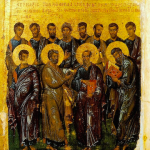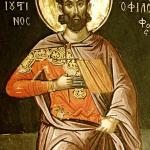Fathers and teachers, I ponder, “What is hell?” I maintain that it is the suffering of being unable to love. (Father Zosima in The Brothers Karamazov)
It’s hard to argue against the position of Dosoevsky’s saintly Father Zosima, and yet this raises the question: what does it mean, then, to be able to love?
I’ve noticed that the orthodox Catholic circles I began traveling in since my reversion in 2002 provide, among other things, a harbor for people who seem not to believe that they are required to fulfill the great commandment to love one another, and much less that to love their enemies. To be clear, I’ve never heard anyone say that he thinks he is exempt from this command, but, just as the progressive church waters down some of the more difficult teachings of Christ, so does the orthodox one — or at least, in my experience, so do many of its professed adherents — water down this one, which is no less difficult, and perhaps infinitely more so. For example, during the brief period when I dated a moderately-well-known Catholic journalist, I suggested that he pray for abortionists and for those who promote abortion. He replied, with disarming honestly, that the thought had never occurred to him.
Indeed, I have often heard orthodox Catholics, when speaking of their responsibilities vis-à-vis other people (not forgetting, of course, that other famous definition of hell — that it is, itself, other people) use the word “charity” in place of the more powerful, intimate “love.” But even in the Douay-Rheims Bible, favorite translation of the orthodox Catholic, Our Lord’s commandment is “Love one another.”
But my point is not to scold; I’ll leave that to others who have far more right to it than I do. My point is to ask the question again: what does it mean to be able to love? And how does one do it?
I’ve been reading some of the unpublished writings of English mystic Caryll Houselander, and in one diary from the 1930s, she writes:
Nothing helps me more to love other people than doing penance for them. If it is an individual for whom I have any bitterness it is a sure cure, but since I took to praying and offering penance daily for all sinners I have found my love of people growing in proportion . . . It seems that in proportion to the love we give to God, He gives us love for each other.
Houselander was a natural-born misanthrope, and yet she strove to love other people; she also noted that Christ himself “sought [the] love” of others.
I used to think I knew all about love. I now know that I know approximately less than nothing about it. But there is a beautiful line in a beautiful song by Dar Williams, “It Happens Every Day”: “the only word for love is everybody’s name.” How do we put that into practice, I wonder?
You can here the song performed live here, starting at 2:42.
http://www.youtube.com/watch?v=vhp-HGsvPPg&w=480&h=390















